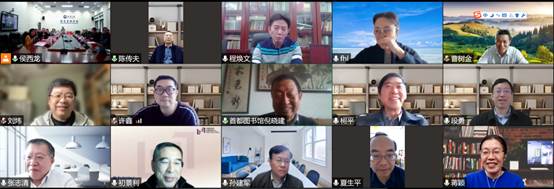On March 26,the Opening Meeting ofResearch on the Construction and Service of Cultural Heritage Smart Data Resources,the 2021 Major Project of the National Social Science Fund of China,was held via virtual and reality combination meeting. ProfessorXiaoguang Wang, Associate Dean of the SIM,Wuhan University,Director of theIntelligent Computing of Cultural Heritage, Philosophy and Social Sciences Laboratory of the Ministry of Education,isthe chief expert of this project.
The experts participated in the opening meeting were as followings:
Huiling Feng,head of the expert review group,First-level Professor at Renmin University of China, and former Executive Vice President of Renmin University of China,
Yong Duan, Professor, CPC Deputy Secretary and Secretary of the Discipline Inspection Commission of Shanghai University,
Chuanfu Chen,Senior Professor of Humanities and Social Sciences at Wuhan University, and Dean of the Graduate School,Wuhan University,
Zhiqing Zhang, Researcher, Deputy Director of the National Library of China,
Xiaojian Ni, Professor, Vice President of the Ancient Books Preservation and Conservation Association of China, and former Director of the Capital Library of China,
Jianjun Sun, Professor, Dean of the School of Information Management, Nanjing University,
Huanwen Cheng, Professor at the School of Information Management, Sun Yat-sen University,Dean of the National Institute of Cultural Heritage and Cultural Development,Sun Yat-sen University,
Jingli Chu,Professor,Director of the Department of Library, Information and Archives Management, University of Chinese Academy of Sciences
Ying Jiang, Researcher, Associate Dean of the Chinese Academy of Social Sciences Evaluation Studies,
Shujin Cao, Professor, former Dean of the School of Information Management, Sun Yat-sen University,
Ping Ke, Professor, Director of Academic Degree Center of Library and Information Science, Business School, Nankai University,
Chuyun Wu, Deputy Director of the Project Department of the Academy of Humanities and Social Sciences, Wuhan University, presided over the meeting.

Qing Fang, Professor, Dean of the Academy of Humanities and Social Sciences, Wuhan University, andWei Lu, Professor, Dean of the SIM, Wuhan University, delivered speeches.Xiaoguang Wangmade an overall report on the project. He pointed out that cultural heritage is the historical evidence and realistic carrier of a nation and its culture, and also the "golden business card" of a country. This project would directly hit 4 shortcomings such as insufficient value mining of cultural heritage, unclear connotation interpretation, serious shortage of data and semantic processing of resources, unclear path of data resources construction transformation and management upgrade, and unclear intelligent service and application mode, and use "smart data" to help Chinese traditional culture "live" and serve the construction of national cultural big data system.
The leaders of 5 sub-projects gave brief reports on the sub-project contents, key tasks and schedule arrangements. They said that this project would absorb the new ideas and new directions of information resources construction and service in the digital intelligence era, fully explore the methods and paths to enhance the value of big data resources of cultural heritage, design feasible plans and strategies for the construction of smart data resources of cultural heritage, interpret the internal logic and service mode of data-driven smart services in the field of cultural heritage, and propose service strategies to meet the needs of diverse subjects and scenes of digital humanities and mass communication based on the prototype system of service platform by building a theoretical system of smart data, a model and standard system of smart data of cultural heritage, and under the concept of value co-creation, open crowdsourcing and smart data driving.
The participating experts put forward relevant suggestions and expectations. They believed that the project has important theoretical value, practical significance and discipline value, and it is necessary to further clearly define the scope and boundary of cultural heritage research, focus on key points and deeply solve common problems; It is necessary to combine artificial intelligence, digital twin technology and metaverse concept to highlight the service innovation of mass communication; It is necessary to strengthen multi-subject and multi-field cooperation, do a good job of coordination between the general project and sub-projects, and give full play to the collective effect; To truly tap the value of "smart data" and produce application results.
Huiling Fengmade a summary of the opening meeting. She pointed out that the project responded to the strategic direction from "investigation and protection of cultural heritage" to "activation of cultural heritage", and it was an advance of Library, Information, and Archives Management into the field of cultural heritage. She suggested that we should set up a framework for activating and intellectualizing the cultural heritage from the macro and the whole, as well as a guiding overall framework from theory to practice, highlight the particularity of cultural heritage in the general, adopt a chain research route, achieve key points in the overall by "subtraction", and focus on conciseness.